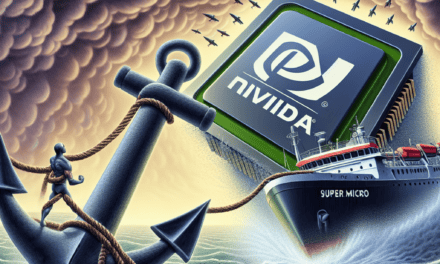“Empowering Tomorrow: Microsoft Pioneers Autonomous AI Agent Development”
Introduction
Microsoft is set to revolutionize the field of artificial intelligence with the introduction of tools and platforms designed to enable the development of autonomous AI agents starting next month. This initiative aims to empower developers and organizations to create sophisticated AI systems capable of operating independently, making decisions, and performing complex tasks without human intervention. By leveraging Microsoft’s robust cloud infrastructure, advanced machine learning algorithms, and comprehensive AI frameworks, users will be able to build, deploy, and manage autonomous agents across various industries. This development marks a significant step forward in AI technology, promising to enhance productivity, innovation, and efficiency in numerous applications.
Introduction To Microsoft’s Autonomous AI Agent Tools
Microsoft is poised to make a significant leap in the field of artificial intelligence with the introduction of its new tools for developing autonomous AI agents, set to be available from next month. This development marks a pivotal moment in the evolution of AI technology, as it promises to empower developers and organizations to create sophisticated AI systems capable of operating independently. The introduction of these tools is expected to accelerate innovation across various industries, offering unprecedented opportunities for automation and efficiency.
The concept of autonomous AI agents is not entirely new, but Microsoft’s initiative represents a substantial advancement in making this technology accessible to a broader audience. Autonomous AI agents are systems designed to perform tasks without human intervention, learning and adapting to new information and environments. These agents can be deployed in a wide range of applications, from customer service bots to complex data analysis systems, and even in autonomous vehicles. By providing the necessary tools to develop such agents, Microsoft is lowering the barrier to entry for businesses and developers eager to harness the power of AI.
One of the key features of Microsoft’s new tools is their integration with existing Microsoft platforms and services. This seamless integration ensures that developers can leverage the full suite of Microsoft’s cloud computing capabilities, data analytics, and machine learning frameworks. Consequently, this integration not only simplifies the development process but also enhances the performance and scalability of the AI agents. Moreover, Microsoft’s commitment to security and compliance means that these tools are designed with robust safeguards to protect sensitive data and ensure ethical AI deployment.
In addition to technical capabilities, Microsoft is also focusing on providing comprehensive support and resources for developers. This includes detailed documentation, tutorials, and a community forum where developers can share insights and collaborate on projects. By fostering a supportive ecosystem, Microsoft aims to encourage innovation and facilitate the rapid development of autonomous AI solutions. Furthermore, the company is offering training programs and certifications to help developers build the necessary skills to effectively utilize these tools, thereby ensuring that a skilled workforce is ready to meet the growing demand for AI expertise.
As organizations increasingly seek to automate processes and enhance decision-making, the demand for autonomous AI agents is expected to rise significantly. Microsoft’s initiative is timely, as it addresses the need for scalable and efficient AI solutions that can adapt to dynamic business environments. By enabling the development of autonomous AI agents, Microsoft is not only advancing the field of artificial intelligence but also contributing to the digital transformation of industries worldwide.
Looking ahead, the impact of Microsoft’s tools on the AI landscape is likely to be profound. As more developers and organizations adopt these tools, we can anticipate a surge in innovative applications that leverage the capabilities of autonomous AI agents. This, in turn, will drive further advancements in AI technology, creating a virtuous cycle of innovation and growth. Ultimately, Microsoft’s efforts to democratize AI development have the potential to reshape industries, enhance productivity, and improve the quality of life for people around the globe.
In conclusion, Microsoft’s upcoming release of tools for developing autonomous AI agents represents a significant milestone in the evolution of artificial intelligence. By providing accessible, integrated, and secure solutions, Microsoft is empowering developers to create cutting-edge AI systems that can operate independently and efficiently. As the world embraces the potential of AI, Microsoft’s initiative is set to play a crucial role in shaping the future of technology and its applications across diverse sectors.
Leveraging Azure For Autonomous AI Agent Development
Microsoft is poised to make a significant leap in the field of artificial intelligence with its announcement to enable the development of autonomous AI agents starting next month. This initiative is set to leverage the robust capabilities of Azure, Microsoft’s cloud computing platform, which has been at the forefront of providing scalable and secure solutions for businesses worldwide. As the demand for intelligent systems that can operate independently continues to grow, Microsoft’s move is both timely and strategic, promising to empower developers and organizations to create sophisticated AI agents that can perform complex tasks without human intervention.
The integration of autonomous AI agent development into Azure is expected to streamline the process for developers, offering a comprehensive suite of tools and services that facilitate the creation, deployment, and management of these agents. Azure’s existing infrastructure, known for its reliability and scalability, provides an ideal foundation for this new capability. By utilizing Azure’s machine learning and cognitive services, developers can harness advanced algorithms and models to build AI agents that are not only autonomous but also adaptive and intelligent.
Moreover, Microsoft’s focus on security and compliance ensures that the development of autonomous AI agents on Azure will adhere to the highest standards of data protection and privacy. This is particularly crucial as AI systems increasingly handle sensitive information and make decisions that can have significant implications. By embedding robust security measures into the development process, Microsoft aims to foster trust and confidence among users and stakeholders.
In addition to security, the integration of autonomous AI agent development into Azure is designed to be user-friendly, catering to both seasoned developers and those new to the field of AI. With intuitive interfaces and comprehensive documentation, Azure aims to lower the barrier to entry, enabling a wider range of individuals and organizations to participate in the AI revolution. This democratization of AI technology is expected to spur innovation and creativity, leading to the development of novel applications across various industries.
Furthermore, Microsoft’s commitment to fostering a collaborative ecosystem is evident in its support for open-source frameworks and interoperability. By allowing developers to integrate their preferred tools and technologies, Azure ensures that the development of autonomous AI agents is flexible and customizable. This approach not only enhances the development experience but also encourages the sharing of knowledge and best practices within the AI community.
As organizations increasingly seek to automate processes and enhance operational efficiency, the ability to develop autonomous AI agents on Azure presents a compelling opportunity. These agents can be deployed across a wide range of applications, from customer service and logistics to healthcare and finance, where they can perform tasks such as data analysis, decision-making, and problem-solving with minimal human oversight. The potential benefits are immense, including increased productivity, reduced costs, and improved service delivery.
In conclusion, Microsoft’s initiative to enable autonomous AI agent development on Azure marks a significant milestone in the evolution of artificial intelligence. By providing a robust, secure, and user-friendly platform, Microsoft is not only advancing the capabilities of AI technology but also empowering developers and organizations to harness its full potential. As this new capability becomes available next month, it is poised to drive innovation and transformation across industries, paving the way for a future where intelligent systems play an integral role in our daily lives.
Microsoft’s AI Frameworks: A Deep Dive
Microsoft’s announcement to enable the development of autonomous AI agents marks a significant milestone in the evolution of artificial intelligence frameworks. This initiative, set to commence next month, is poised to revolutionize how developers and organizations approach AI-driven solutions. By providing the tools and infrastructure necessary for creating autonomous agents, Microsoft is not only expanding its AI capabilities but also setting a new standard in the industry.
The concept of autonomous AI agents is not entirely new; however, the ability to develop them with ease and efficiency has been a challenge for many. Microsoft’s new framework aims to address these challenges by offering a comprehensive suite of tools that streamline the development process. This move is expected to democratize access to advanced AI technologies, allowing a broader range of developers to experiment and innovate. Consequently, this could lead to a surge in AI applications across various sectors, from healthcare to finance, and beyond.
One of the key components of Microsoft’s framework is its integration with existing AI services and platforms. By leveraging its robust cloud infrastructure, Microsoft ensures that developers have access to scalable resources necessary for training and deploying AI models. This integration not only enhances the performance of AI agents but also facilitates seamless collaboration between different AI services. Moreover, Microsoft’s commitment to open-source principles means that developers can customize and extend the framework to suit their specific needs, fostering a culture of innovation and collaboration.
In addition to technical capabilities, Microsoft’s framework emphasizes ethical AI development. As autonomous agents become more prevalent, concerns about their impact on society and ethical considerations are paramount. Microsoft has incorporated guidelines and tools within the framework to help developers build AI systems that are transparent, fair, and accountable. This proactive approach to ethical AI development is crucial in gaining public trust and ensuring that AI technologies are used responsibly.
Furthermore, Microsoft’s initiative is likely to have significant implications for the AI talent landscape. By lowering the barriers to entry for AI development, more individuals will have the opportunity to acquire skills in this rapidly growing field. This democratization of AI education could lead to a more diverse and inclusive AI community, which is essential for driving innovation and addressing complex global challenges.
As we look to the future, the potential applications of autonomous AI agents are vast and varied. From automating routine tasks to providing personalized recommendations, these agents have the potential to transform industries and improve quality of life. However, with great power comes great responsibility. It is imperative that developers, organizations, and policymakers work together to ensure that AI technologies are developed and deployed in a manner that benefits society as a whole.
In conclusion, Microsoft’s decision to enable autonomous AI agent development represents a pivotal moment in the AI landscape. By providing the necessary tools and infrastructure, Microsoft is empowering developers to push the boundaries of what is possible with AI. As this initiative unfolds, it will be fascinating to observe how it shapes the future of AI and its impact on various sectors. Ultimately, the success of this endeavor will depend on the collective efforts of the AI community to harness the power of autonomous agents responsibly and ethically.
Integrating Microsoft Cognitive Services In AI Agents

Microsoft’s recent announcement to enable the development of autonomous AI agents marks a significant milestone in the field of artificial intelligence. Starting next month, developers will have the opportunity to integrate Microsoft Cognitive Services into their AI agents, thereby enhancing their capabilities and functionalities. This development is poised to revolutionize how AI agents are designed and deployed, offering a new level of sophistication and autonomy.
Microsoft Cognitive Services, a collection of APIs, SDKs, and services, provides developers with the tools necessary to infuse AI into their applications. These services cover a wide range of functionalities, including vision, speech, language, and decision-making capabilities. By integrating these services, developers can create AI agents that not only understand and interpret human language but also perceive and interact with the world in a more human-like manner. This integration is expected to lead to the creation of AI agents that are more intuitive, responsive, and capable of performing complex tasks with minimal human intervention.
The ability to develop autonomous AI agents is particularly significant in industries where efficiency and precision are paramount. For instance, in healthcare, AI agents equipped with Microsoft Cognitive Services can assist in diagnosing diseases by analyzing medical images and patient data. In the financial sector, these agents can enhance fraud detection systems by identifying unusual patterns and behaviors. Moreover, in customer service, AI agents can provide more personalized and efficient support by understanding and responding to customer inquiries in real-time.
Furthermore, the integration of Microsoft Cognitive Services into AI agents is expected to accelerate the adoption of AI technologies across various sectors. As these services become more accessible and easier to implement, businesses of all sizes will be able to leverage AI to improve their operations and deliver better services to their customers. This democratization of AI technology is likely to spur innovation and drive economic growth, as companies seek to harness the power of AI to gain a competitive edge.
In addition to the practical applications, the development of autonomous AI agents raises important ethical and regulatory considerations. As AI agents become more autonomous, questions about accountability, transparency, and privacy become increasingly pertinent. Microsoft has acknowledged these concerns and is committed to ensuring that its AI technologies are developed and deployed responsibly. The company has established ethical guidelines and principles to guide the development of AI agents, emphasizing the importance of fairness, reliability, and safety.
Moreover, Microsoft is actively collaborating with policymakers, industry leaders, and academia to address the ethical and regulatory challenges associated with AI. By fostering an open dialogue and sharing best practices, Microsoft aims to create a framework that ensures the responsible use of AI technologies while maximizing their potential benefits.
In conclusion, Microsoft’s initiative to enable the development of autonomous AI agents through the integration of Cognitive Services represents a significant advancement in the field of artificial intelligence. This development promises to enhance the capabilities of AI agents, making them more intuitive and efficient across various industries. While the potential benefits are immense, it is crucial to address the ethical and regulatory challenges that accompany this technological advancement. By doing so, Microsoft is paving the way for a future where AI agents can operate autonomously and responsibly, ultimately transforming the way we live and work.
Best Practices For Using Microsoft AI APIs
As Microsoft prepares to launch its new suite of tools for developing autonomous AI agents next month, it is crucial for developers and businesses to understand the best practices for utilizing Microsoft AI APIs effectively. These APIs, which serve as the backbone for creating intelligent applications, offer a range of functionalities that can significantly enhance the capabilities of AI agents. To maximize the potential of these tools, it is essential to approach their use with a strategic mindset, ensuring that the integration of AI into existing systems is both seamless and efficient.
To begin with, understanding the specific needs of your project is paramount. Before diving into the technical aspects of the APIs, it is advisable to conduct a thorough analysis of the objectives you aim to achieve with your AI agent. This involves identifying the tasks that the AI will perform, the data it will process, and the outcomes it is expected to deliver. By having a clear vision of the end goals, developers can select the most appropriate APIs from Microsoft’s extensive offerings, ensuring that the chosen tools align with the project’s requirements.
Once the objectives are clearly defined, the next step is to familiarize oneself with the available APIs and their functionalities. Microsoft provides comprehensive documentation and resources that detail the capabilities of each API, making it easier for developers to understand how they can be leveraged to build autonomous AI agents. It is advisable to take advantage of these resources, as they offer valuable insights into the best practices for implementation, as well as potential pitfalls to avoid.
In addition to understanding the technical aspects of the APIs, it is also important to consider the ethical implications of deploying AI agents. As these agents become more autonomous, they will inevitably interact with users and make decisions that can have significant impacts. Therefore, developers must ensure that their AI systems are designed with fairness, transparency, and accountability in mind. This involves implementing robust mechanisms for monitoring and evaluating the performance of AI agents, as well as establishing protocols for addressing any issues that may arise.
Moreover, collaboration and continuous learning are key components of successful AI development. Engaging with the broader AI community can provide valuable insights and foster innovation. Microsoft encourages developers to participate in forums, workshops, and other collaborative platforms where they can share experiences and learn from others. By staying informed about the latest advancements and trends in AI technology, developers can ensure that their projects remain at the forefront of innovation.
Finally, it is essential to test and iterate on AI models continuously. The dynamic nature of AI development means that models must be regularly updated and refined to maintain their effectiveness. By adopting an iterative approach, developers can identify areas for improvement and make necessary adjustments, ensuring that their AI agents continue to perform optimally over time.
In conclusion, as Microsoft prepares to enable the development of autonomous AI agents through its advanced APIs, adhering to best practices is crucial for success. By clearly defining project objectives, understanding the available tools, considering ethical implications, fostering collaboration, and embracing continuous improvement, developers can harness the full potential of Microsoft’s AI offerings. This strategic approach will not only enhance the capabilities of AI agents but also ensure that they are deployed responsibly and effectively in various applications.
Case Studies: Successful AI Agents Built With Microsoft Tools
In recent years, the development of autonomous AI agents has become a focal point for many technology companies, with Microsoft emerging as a leader in this domain. As Microsoft prepares to enable the development of autonomous AI agents starting next month, it is worthwhile to examine some successful case studies that highlight the potential of Microsoft’s tools in this field. These examples not only demonstrate the capabilities of Microsoft’s AI technologies but also underscore the transformative impact they can have across various industries.
One notable case study involves a financial services company that leveraged Microsoft’s AI tools to create an autonomous trading agent. This agent was designed to analyze vast amounts of market data in real-time, identify trading opportunities, and execute trades with minimal human intervention. By utilizing Microsoft’s Azure Machine Learning and Cognitive Services, the company was able to develop an agent that not only improved trading efficiency but also significantly reduced operational costs. The success of this project illustrates how Microsoft’s AI tools can be harnessed to optimize complex financial processes, thereby providing a competitive edge in a fast-paced market.
Transitioning to another industry, a healthcare provider successfully implemented an AI-powered diagnostic agent using Microsoft’s technologies. This agent was developed to assist medical professionals in diagnosing diseases by analyzing patient data and medical images. By integrating Microsoft’s AI capabilities, such as natural language processing and computer vision, the healthcare provider was able to create an agent that offered accurate and timely diagnostic support. This not only enhanced the quality of patient care but also alleviated the workload on medical staff, allowing them to focus on more critical tasks. The deployment of this AI agent underscores the potential of Microsoft’s tools to revolutionize healthcare delivery by improving diagnostic accuracy and efficiency.
In the realm of customer service, a retail company utilized Microsoft’s AI tools to develop an autonomous customer support agent. This agent was designed to handle a wide range of customer inquiries, from product information to order tracking, without human intervention. By employing Microsoft’s AI technologies, such as conversational AI and sentiment analysis, the company was able to create an agent that provided personalized and efficient customer service. The implementation of this AI agent not only enhanced customer satisfaction but also allowed the company to allocate human resources to more complex customer interactions. This case study highlights the ability of Microsoft’s tools to transform customer service operations by automating routine tasks and improving response times.
Furthermore, in the manufacturing sector, a company developed an AI-driven predictive maintenance agent using Microsoft’s AI solutions. This agent was tasked with monitoring equipment performance and predicting potential failures before they occurred. By leveraging Microsoft’s machine learning algorithms and IoT capabilities, the company was able to create an agent that significantly reduced downtime and maintenance costs. The success of this project demonstrates how Microsoft’s AI tools can be applied to enhance operational efficiency and reliability in industrial settings.
In conclusion, these case studies exemplify the diverse applications and benefits of autonomous AI agents developed with Microsoft’s tools. As Microsoft prepares to enable further development of such agents, these examples serve as a testament to the transformative potential of AI across various sectors. By providing robust and versatile AI solutions, Microsoft continues to empower organizations to innovate and excel in an increasingly competitive landscape.
Future Trends In Autonomous AI With Microsoft Technologies
Microsoft’s announcement to enable the development of autonomous AI agents marks a significant milestone in the evolution of artificial intelligence technologies. As the tech giant prepares to roll out this capability next month, the implications for various industries are profound. Autonomous AI agents, which can operate independently to perform tasks, make decisions, and learn from their environments, represent a leap forward in the quest for more intelligent and adaptable systems. This development is poised to transform how businesses operate, offering new efficiencies and capabilities that were previously unattainable.
The introduction of autonomous AI agents by Microsoft is expected to leverage the company’s existing suite of AI tools and platforms, such as Azure Machine Learning and the Microsoft Cognitive Toolkit. By integrating these advanced technologies, Microsoft aims to provide developers with the resources needed to create AI agents that can function with minimal human intervention. This move aligns with the broader trend in the tech industry towards creating more self-sufficient AI systems that can handle complex tasks without constant oversight.
One of the key benefits of autonomous AI agents is their ability to process and analyze vast amounts of data in real-time, leading to more informed decision-making. For instance, in the financial sector, these agents could monitor market trends and execute trades with precision, potentially increasing profitability while reducing the risk of human error. Similarly, in healthcare, autonomous AI could assist in diagnosing diseases by analyzing patient data and medical records, offering recommendations that enhance the decision-making process for medical professionals.
Moreover, the deployment of autonomous AI agents is expected to drive innovation in customer service. By utilizing natural language processing and machine learning algorithms, these agents can interact with customers, answer queries, and resolve issues without human intervention. This not only improves efficiency but also enhances the customer experience by providing instant support and personalized interactions.
However, the rise of autonomous AI agents also brings challenges that need to be addressed. Ethical considerations, such as ensuring transparency in decision-making processes and preventing biases in AI algorithms, are paramount. Microsoft has emphasized its commitment to responsible AI development, highlighting the importance of creating systems that are fair, reliable, and secure. As these technologies become more prevalent, establishing robust ethical guidelines will be crucial to maintaining public trust and ensuring that AI agents are used for the benefit of society.
Furthermore, the integration of autonomous AI agents into existing business processes requires careful planning and adaptation. Organizations must invest in training and upskilling their workforce to effectively collaborate with AI systems. This transition period is essential to maximize the potential of autonomous AI while minimizing disruptions to current operations.
In conclusion, Microsoft’s initiative to enable the development of autonomous AI agents represents a pivotal moment in the advancement of artificial intelligence. By providing the tools and platforms necessary for creating these sophisticated systems, Microsoft is paving the way for a future where AI plays an increasingly central role in various sectors. As businesses and industries adapt to this new reality, the potential for innovation and efficiency gains is immense. However, it is equally important to address the ethical and practical challenges that accompany this technological evolution, ensuring that the benefits of autonomous AI are realized in a responsible and sustainable manner.
Q&A
1. **What is Microsoft planning to enable next month?**
Microsoft is planning to enable the development of autonomous AI agents.
2. **What are autonomous AI agents?**
Autonomous AI agents are systems that can perform tasks and make decisions independently without human intervention.
3. **Why is Microsoft focusing on autonomous AI agents?**
Microsoft aims to enhance productivity and innovation by allowing AI to handle complex tasks autonomously.
4. **What tools or platforms will Microsoft use for this development?**
Microsoft will likely leverage its existing platforms like Azure AI and integrate with tools such as OpenAI’s models.
5. **Who can benefit from Microsoft’s autonomous AI agents?**
Businesses, developers, and industries looking to automate processes and improve efficiency can benefit.
6. **What are potential applications of autonomous AI agents?**
Applications include customer service automation, data analysis, supply chain management, and personalized user experiences.
7. **What challenges might arise with the development of autonomous AI agents?**
Challenges include ensuring ethical use, maintaining data privacy, and managing the complexity of AI decision-making.
Conclusion
Microsoft’s initiative to enable autonomous AI agent development marks a significant step forward in the evolution of artificial intelligence. By providing tools and platforms for creating self-governing AI systems, Microsoft is positioning itself at the forefront of AI innovation. This move is likely to accelerate the development of AI technologies that can operate independently, making decisions and performing tasks without human intervention. It reflects a broader trend in the tech industry towards more sophisticated and capable AI systems. As these autonomous agents become more prevalent, they have the potential to transform industries by improving efficiency, reducing costs, and enabling new capabilities. However, this also raises important considerations around ethics, security, and the need for robust governance frameworks to ensure these technologies are developed and deployed responsibly. Overall, Microsoft’s efforts could significantly impact the future landscape of AI, driving both technological advancement and important discussions around the responsible use of AI.





